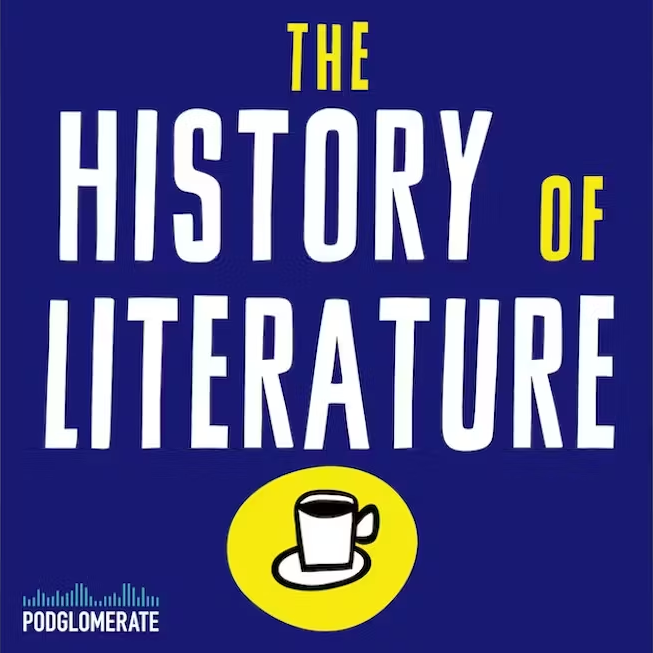history of literature
-
The History of Literature #500 — Episode 500! Meg White, Listener Emails, Johnson and Boswell, and More! (with Margot Livesey)
It’s Episode 500! Jacke shares some thoughts on Meg White’s drumming, Boswell and Johnson, and living in Taiwan. Then author Margot Livesey (The Boy in the Field, The Flight of Gemma Hardy) joins Jacke for a discussion of some My Last Books with past guests. Additional listening suggestions: Help support the show at patreon.com/literature or historyofliterature.com/donate. The History of… Continue reading
-
The History of Literature #482 — Moby Dick – 10 Essential Questions (Part Two)
Is Moby-Dick truly the Great American Novel? How did contemporary critics miss it? When (and how) was the book rediscovered? Jacke goes through all this and more, as he continues the countdown of Top 10 Essential Questions about Herman Melville’s 1851 masterpiece. Additional listening: Help support the show at patreon.com/literature or historyofliterature.com/donate. The History of Literature Podcast is a member… Continue reading
-
The History of Literature #472 — The Art of Not Knowing
In this special episode, Jacke pays tribute to a friend, including a consideration of endings and beginnings, mystery and grace, and two powerful works: John Berger’s The Shape of a Pocket and James Joyce’s masterpiece “The Dead.” Continue reading
-
The History of Literature #471 — Angels of War (with Ariel Lawhon, Kristina McMorris, and Susan Meissner
In this episode, Jacke talks to three bestselling authors – Susan Meissner, Kristina McMorris, and Ariel Lawhon – who came together to write When We Had Wings, a historical novel about a trio of World War II nurses who waged their own battle for freedom and survival. PLUS we hear what Charlie Lovett, bibliophile and Lewis… Continue reading
-
The History of Literature #462 — My Last Book (with Laurie Frankel)
The question stopped Jacke in his tracks. “Dear Jacke,” said the emailer. “What do you want your “last book” to be? This will be the last book you will ever read…” And so, he set about determining what his “last book” should be, with help from dozens of guests (and counting). In this special episode,… Continue reading
-
The History of Literature #454 — Emma’s Pick – A Victorian Ghost Story
Happy Halloween! In this episode, producer Emma selects a classic Victorian ghost story for Jacke to read: “Eveline’s Visitant” by the publishing powerhouse Mary Elizabeth Braddon. Additional listening suggestions: Help support the show at patreon.com/literature or historyofliterature.com/shop. The History of Literature Podcast is a member of Lit Hub Radio and the Podglomerate Network. Learn more at www.thepodglomerate.com/historyofliterature. Continue reading
-
The History of Literature #446 — Percy Bysshe Shelley – The Early Years
Jacke takes a look at the early years of Percy Bysshe Shelley, from his idyllic childhood, to his rebellious student years, to his experiments in free love, radical politics, and Wordsworthian poetry. Works discussed include “Queen Mab,” “Hymn to Intellectual Beauty,” “Alastor, or the Spirit of Solitude,” “Mont Blanc,” “Mutability [“We are as clouds that… Continue reading
-
The History of Literature #445 — What Would Cervantes Do? (with David Castillo and William Egginton)
As the author of what is generally considered the first and perhaps greatest novel of the modern era, Miguel de Cervantes and his masterpiece Don Quixote belongs on every shelf. But as two scholars point out in their new book, What Would Cervantes Do? Navigating Post-Truth with Spanish Baroque Literature the lessons to be learned from Cervantes go beyond… Continue reading
-
The History of Literature #440 — Emma’s Pick – “A Pair of Silk Stockings” by Kate Chopin
Today, Kate Chopin (1851-1904) might be best known for her groundbreaking feminist novel The Awakening (1899). But she was also an accomplished short story writer, publishing in national magazines like Atlantic Monthly and Vogue. In this episode, Jacke provides an annotated reading of producer Emma’s latest pick: “A Pair of Silk Stockings” (1897) Chopin’s story of a down-on-her-luck woman who… Continue reading
-
The History of Literature #435 – The Story of the Hogarth Press Part 2 – The Virginia Woolf Story That Changed Everything
In our last episode, we looked at the decision by Virginia Woolf and her husband Leonard to purchase a printing press and run it out of their home. What began as a hobby – a relief from the strains of writing – soon turned into a genuine business, as The Hogarth Press met with success.… Continue reading
